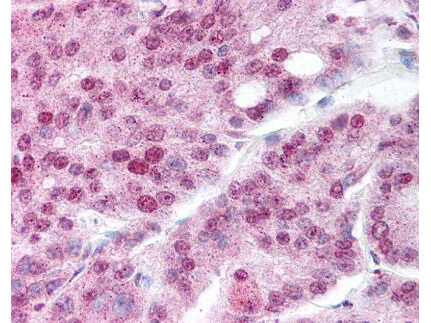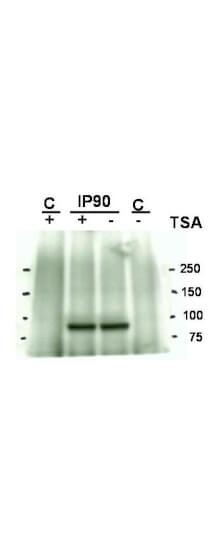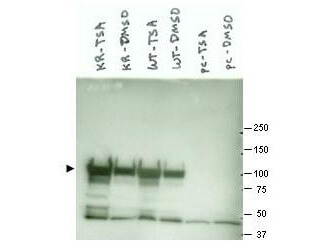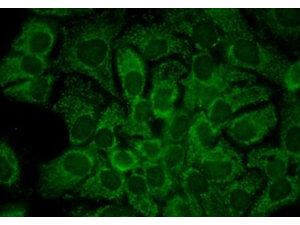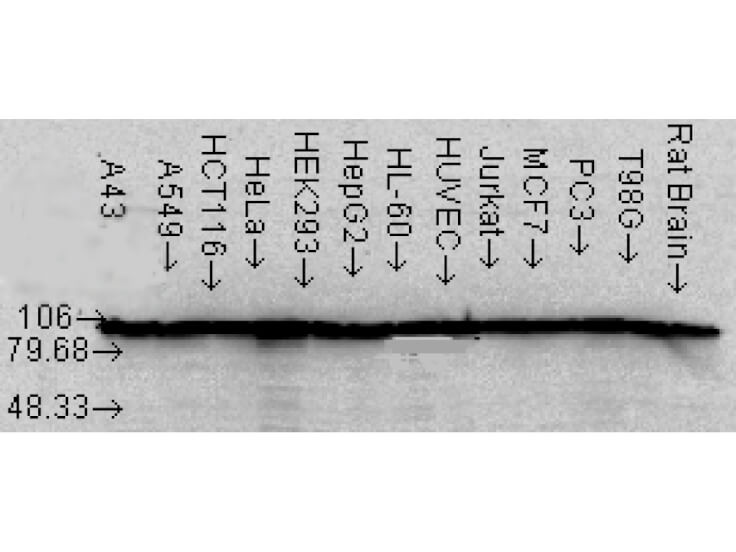Datasheet is currently unavailable. Try again or CONTACT US
HSP90 K294 Antibody
Rabbit Polyclonal
9 References
600-401-981S
600-401-981
25 µL
100 µg
Liquid (sterile filtered)
Liquid (sterile filtered)
WB, ELISA, IHC
Human
Rabbit
Shipping info:
$50.00 to US & $70.00 to Canada for most products. Final costs are calculated at checkout.
Product Details
Anti-Heat Shock Protein HSP 90-alpha acetyl specific K294 (RABBIT) Antibody - 600-401-981
rabbit anti-Heat Shock Protein HSP 90-alpha acetyl specific K294 antibody, rabbit anti-Heat Shock Protein HSP 90-alpha acetylated Lys294 antibody, HSP 86 antibody, Heat shock 86kDa antibody, Renal carcinoma antigen NY REN 38 antibody, Heat shock 90kDa protein 1 alpha antibody, Lipopolysaccharide-associated protein 2, LAP-2, HSP90A, HSPC1, HSPCA, HSP90AA1, HSP 90-α
Rabbit
Polyclonal
IgG
Target Details
HSP90AA1 - View All HSP90AA1 Products
Human
Conjugated Peptide
This affinity purified antibody was prepared from whole rabbit serum produced by repeated immunizations with a synthetic peptide corresponding to amino acids surrounding K294 of human Hsp90.
This affinity purified antibody is directed against human Hsp90 protein acetylated at K294. The product was affinity purified from monospecific antiserum by immunoaffinity chromatography using acetyl-peptide coupled to agarose beads followed by solid phase adsorption against non-acetyl peptide. While ELISA data show strong reactivity with the acetylated form of the immunizing peptide and minimal reactivity with the non-acetylated form, to date western blotting data are not definitive for acetyl K294 specificity as blots show equivalent staining of lysates from cells either treated or untreated with Trichostatin A (an HDAC inhibitor). A BLAST analysis was used to suggest cross-reactivity with Hsp90 from human, mouse, rat, monkey, chicken and Drosophila based on 100% homology with the immunizing sequence. Reactivity of this antibody with Hsp90 from other species is unknown.
Application Details
ELISA, IHC, WB
This affinity purified antibody has been tested for use in ELISA, immunohistochemistry and western blot. This antibody reacts strongly with the acetylated form of the immunizing peptide and shows minimal reactivity with the non-acetylated form when tested by ELISA. To date, western blotting shows equivalent staining of lysates either treated or untreated with Trichostatin A (an HDAC inhibitor). Therefore, western blotting results are not definitive for demonstrating the specificity of this reagent. Specific conditions for reactivity should be optimized by the end user. Expect a band approximately 90 kDa in size corresponding to Hsp90 protein by western blotting in the appropriate cell lysate or extract.
Formulation
0.96 mg/mL by UV absorbance at 280 nm
0.02 M Potassium Phosphate, 0.15 M Sodium Chloride, pH 7.2
0.01% (w/v) Sodium Azide
None
Shipping & Handling
Dry Ice
Store vial at -20° C prior to opening. Aliquot contents and freeze at -20° C or below for extended storage. Avoid cycles of freezing and thawing. Centrifuge product if not completely clear after standing at room temperature. This product is stable for several weeks at 4° C as an undiluted liquid. Dilute only prior to immediate use.
Expiration date is one (1) year from date of receipt.
This antibody is designed, produced, and validated as part of a collaboration between Rockland and the National Cancer Institute (NCI) and is suitable for Cancer, Immunology and Nuclear Signaling research. Hsp90 is a member of the heat shock protein 90 family, the members of which are highly conserved between isoforms and species. Hsp90 functions as a molecular chaperone and has ATPase activity. Hsp90 is a cytoplasmic protein that forms a homodimer in vivo and interacts with TOM34, AHSA1, HDAC6 and SMYD3. Several signal transduction pathways depend on Hsp90 function, including pathways involving erbB2, hypoxia sensitivity (Hif1 alpha), and steroid hormone receptors (for example, androgen, progesterone, glucocorticoid, and aryl-hydrocarbon). Recent reports show that Hsp90 from tumor cells has increased sensitivity to small molecule inhibitors (for example, 17AAG). The mechanism of the differential sensitivity of Hsp90 from normal versus tumor cells is unknown, although mutation has been ruled out. One possible mechanism may be differences in post-translational modification of tumor Hsp90. K294 was found to be acetylated in purified Hsp90 from SkBr3 cells, a breast cancer cell line.
Zhang X et al. (2022). MOF negatively regulates estrogen receptor α signaling via CUL4B-mediated protein degradation in breast cancer. Front Oncol.
Applications
WB, IB, PCA
Kotwal A et al. (2021). Hsp90 chaperone facilitates E2F1/2-dependent gene transcription in human breast cancer cells. Eur J Cell Biol.
Applications
WB, IB, PCA
Sun K et al. (2020). SIRT2 suppresses expression of inflammatory factors via Hsp90-glucocorticoid receptor signalling. J Cell Mol Med.
Applications
WB, IB, PCA
Ha N et al. (2020). A novel histone deacetylase 6 inhibitor improves myelination of Schwann cells in a model of Charcot–Marie–Tooth disease type 1A. Br J Pharmacol.
Applications
WB, IB, PCA
Manca S et al. (2019). The role of alcohol-induced Golgi fragmentation for androgen receptor signaling in prostate cancer. Mol Cancer Res.
Applications
WB, IB, PCA
Mo et al. (2018). Aberrant GlyRS-HDAC6 interaction linked to axonal transport deficits in Charcot-Marie-Tooth neuropathy. Nature Communications
Applications
WB, IB, PCA
Nakakura T et al. (2017). ATAT1 is essential for regulation of homeostasis-retaining cellular responses in corticotrophs along hypothalamic-pituitary-adrenal axis. Cell Tissue Res.
Applications
WB, IB, PCA
Deskin et al. (2016). Requirement of HDAC6 for activation of Notch1 by TGF-β1. Scientific Reports
Applications
WB, IB, PCA
Jimenez-Canino R et al. (2016). Histone Deacetylase 6–Controlled Hsp90 Acetylation Significantly Alters Mineralocorticoid Receptor Subcellular Dynamics But Not its Transcriptional Activity. Endocrinology.
Applications
IHC, ICC, Histology
This product is for research use only and is not intended for therapeutic or diagnostic applications. Please contact a technical service representative for more information. All products of animal origin manufactured by Rockland Immunochemicals are derived from starting materials of North American origin. Collection was performed in United States Department of Agriculture (USDA) inspected facilities and all materials have been inspected and certified to be free of disease and suitable for exportation. All properties listed are typical characteristics and are not specifications. All suggestions and data are offered in good faith but without guarantee as conditions and methods of use of our products are beyond our control. All claims must be made within 30 days following the date of delivery. The prospective user must determine the suitability of our materials before adopting them on a commercial scale. Suggested uses of our products are not recommendations to use our products in violation of any patent or as a license under any patent of Rockland Immunochemicals, Inc. If you require a commercial license to use this material and do not have one, then return this material, unopened to: Rockland Inc., P.O. BOX 5199, Limerick, Pennsylvania, USA.

